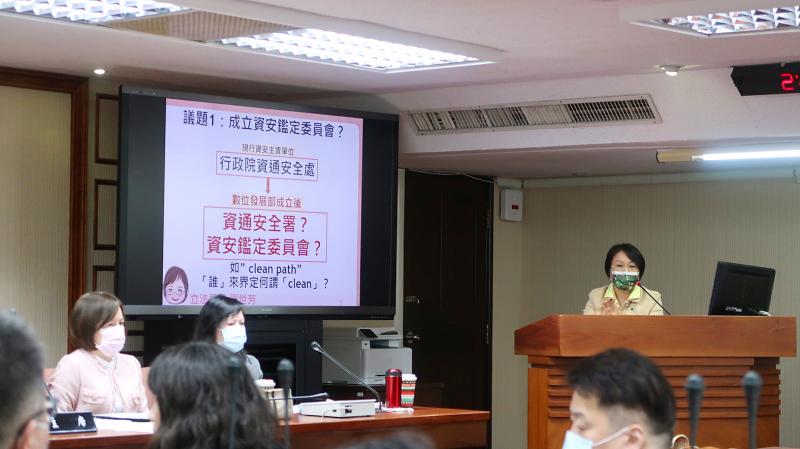Experts on Monday recommended the drafting of a digital development act or basic information act, and urged the Ministry of Education to have universities establish information security departments or schools.
At a public hearing at the Legislative Yuan on the function and resource use of a planned ministry of digital development, National Sun Yat-sen University vice president Huang I-yu (黃義佑) said that he supports the government’s decision to establish the ministry.
Taiwan should follow Israel’s example and invest about NT$500 million (US$17.54 million) to attract talent to its cybersecurity sector, 20 percent of which should be subsidies to local firms, Huang said.

Photo: Chen Yu-fu, Taipei Times
The Ministry of Education should encourage universities to set up departments of cybersecurity, Huang said, adding that the information security sector should not be concentrated in northern Taiwan.
The government must draft a special law, geared toward developing the nation’s digital capabilities, with a commission that can spur digital innovation, not just oversee digital affairs, said Chien Chung-liang (錢宗良), a physician in National Taiwan University’s College of Medicine.
The government, by outsourcing too many projects, risks becoming out of touch with technological advancements, said Chen Chuan-hsi (陳泉錫), a former director of the Ministry of Finance’s Financial Data Center, adding that officials also lack effective measures to supervise the development, quality and security of new software.
The government should collaborate with white-hat hackers distributed among its agencies and conduct routine drills to help officials respond to attacks, he said.
A digital development agency needs to communicate across departments, and be capable of integrating existing information systems or innovating new ones, Chen said.
Chunghwa Telecom cybersecurity director Ma Hung-tsan (馬宏燦) said that the government should encourage entrepreneurship in cybersecurity by setting up a fund.
The government could help lay the foundation for cybersecurity at small and medium-sized enterprises, as they lack the means to defend themselves, Ma said.
Before establishing a ministry, the government should decide on its vision for digital development: whether it would regulate via legislation, as in Europe, or have firms self-regulate, as in Silicon Valley, TEDxTaipei founder Jason Hsu (許毓仁) said.
An agency in charge of digital innovation should not “absorb” talent from other agencies, Hsu said, adding that knowing how to use digitization as a management tool is key.

‘DENIAL DEFENSE’: The US would increase its military presence with uncrewed ships, and submarines, while boosting defense in the Indo-Pacific, a Pete Hegseth memo said The US is reorienting its military strategy to focus primarily on deterring a potential Chinese invasion of Taiwan, a memo signed by US Secretary of Defense Pete Hegseth showed. The memo also called on Taiwan to increase its defense spending. The document, known as the “Interim National Defense Strategic Guidance,” was distributed this month and detailed the national defense plans of US President Donald Trump’s administration, an article in the Washington Post said on Saturday. It outlines how the US can prepare for a potential war with China and defend itself from threats in the “near abroad,” including Greenland and the Panama

A wild live dugong was found in Taiwan for the first time in 88 years, after it was accidentally caught by a fisher’s net on Tuesday in Yilan County’s Fenniaolin (粉鳥林). This is the first sighting of the species in Taiwan since 1937, having already been considered “extinct” in the country and considered as “vulnerable” by the International Union for Conservation of Nature. A fisher surnamed Chen (陳) went to Fenniaolin to collect the fish in his netting, but instead caught a 3m long, 500kg dugong. The fisher released the animal back into the wild, not realizing it was an endangered species at

The Chinese Nationalist Party (KMT) is maintaining close ties with Beijing, the Democratic Progressive Party (DPP) said yesterday, hours after a new round of Chinese military drills in the Taiwan Strait began. Political parties in a democracy have a responsibility to be loyal to the nation and defend its sovereignty, DPP spokesman Justin Wu (吳崢) told a news conference in Taipei. His comments came hours after Beijing announced via Chinese state media that the Chinese People’s Liberation Army’s Eastern Theater Command was holding large-scale drills simulating a multi-pronged attack on Taiwan. Contrary to the KMT’s claims that it is staunchly anti-communist, KMT Deputy

The High Prosecutors’ Office yesterday withdrew an appeal against the acquittal of a former bank manager 22 years after his death, marking Taiwan’s first instance of prosecutors rendering posthumous justice to a wrongfully convicted defendant. Chu Ching-en (諸慶恩) — formerly a manager at the Taipei branch of BNP Paribas — was in 1999 accused by Weng Mao-chung (翁茂鍾), then-president of Chia Her Industrial Co, of forging a request for a fixed deposit of US$10 million by I-Hwa Industrial Co, a subsidiary of Chia Her, which was used as collateral. Chu was ruled not guilty in the first trial, but was found guilty